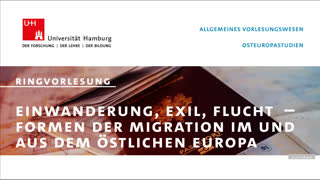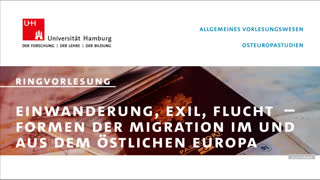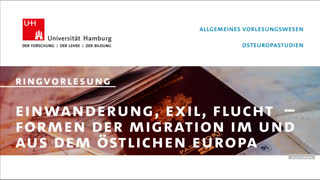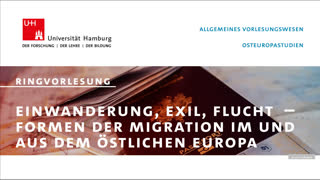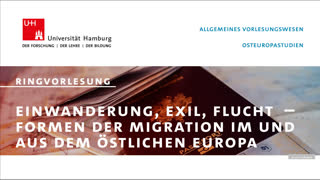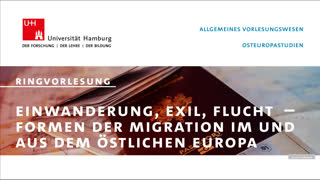New Russian Exile and Migrants’ Activism in Georgia - PD Dr. Tsypylma Darieva - University of Hamburg
- Lecture2Go
- Catalog
- F.5 - Geisteswissenschaften
- Sprache, Literatur, Medien (SLM I + II)
- Einwanderung, Exil, Flucht – Formen der Migration im und aus dem östlichen Europa
Catalog
2065 Views
18.01.2023
New Russian Exile and Migrants’ Activism in Georgia
Ringvorlesung Osteuropastudien WiSe 2022/23
Gerade erlebt Deutschland durch Geflüchtete aus der Ukraine und der Exilierung russischer oder belarussischer Intellektueller Formen der Migration, die nach der Systemwende 1989/1991 und dem Ende des II. Weltkriegs historisch geworden zu sein schienen. Hierdurch treten andere Formen der Migration wie Arbeitsmigration, nomadische oder transnationale Lebensentwürfe in den Hintergrund, die in den letzten beiden Jahrzehnten die Wahrnehmung und öffentliche Diskussion des Themas dominiert haben. Die Ringvorlesung will die verschiedenen Formen von Exil, Flucht und Migration zwischen Deutschland und Mittelosteuropa und Osteuropa in den Blick nehmen und analysieren. Das Ziel der Vortragsreihe ist es, Formen geographischer und kultureller Mobilität aus dem Blickwinkel verschiedener Disziplinen (Geschichte, Kulturwissenschaft, Ethnologie, Literaturwissenschaft, Politikwissenschaften) zu beleuchten. Ein besonderer Schwerpunkt wird auf der Differenzierung von freiwilliger vs. erzwungener Migration (Flucht, Vertreibung, Exil) liegen.
================
After Russia’s full-scale invasion against Ukraine, hundreds of thousands of Russian citizens fled their homeland and relocated to different countries. Caused by harsh repressions and implementation of the ‘politics of fear’ (Gelman 2021, Bronnikova 2022), new migratory movements were intensified by the Russian invasion in Ukraine and lead to a new landscape of destination countries including former Soviet republics in the South Caucasus. The flow of Russian emigrants in Georgia differs from Russian immigration to Western Europe and deserves special attention as we witness a rise of North-South migration motivated by political and economic insecurity in Russia. This has provoked a new level of fear and tensions in Georgia, yet opportunities for newcomers and for the hostland. According to preliminary demographic characteristics of Russian emigrants in Georgia, it is mostly young, educated citizens from larger Russian cities with a high number of politically active and socially engaged Russian citizens.
The aim of this presentation is to reflect on preliminary research results based on the ongoing pilot project on political migration in Germany and Georgia. The goal of the multi-sited ZOiS pilot project is to understand the process of relocation as an individual and collective experience and to analyse the logic of transnational engagement within the framework of political remittances. More specifically, I will discuss how Russian activists organise themselves in a new place, the main factors influencing transnational activism, the repertoire of migrants’ civic activism in Georgia and its limits.
Verantwortliche Organisation: Prof. Dr. Anja Tippner, Osteuropastudien / Slavistik, UHH; Prof. Dr. Monica Rüthers, Geschichte, UHH; Prof. Dr. J. Otto Habeck, Ethnologie, UHH In Zusammenarbeit mit DGO, Landeszentrale für Politische Bildung Hamburg, IKGN, HSU
================
Videoproduktion: eLearning-Büro der Fakultät für Geisteswissenschaften (uhh.de/gw-ebuero)
Technical support
Please click on the link bellow and then fill out the required fields to contact our Support Team!
RRZ Support Link

